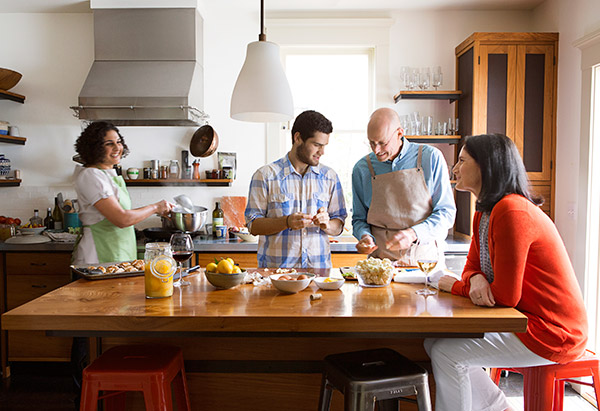What the Ultimate Food Expert Eats for Dinner
For years writer Michael Pollan has told us what to put on our plates. ("Eat food. Not too much. Mostly plants," he famously wrote.) Now he's learning what cooking is really all about: slowing down, enjoying the process, and filling the kitche

Photo: Coral Von Zumwalt
PAGE 2
Prep School: The dinner crew (from left, Samin Nosrat, Isaac Pollan, Michael Pollan, and Judith Belzer) chop, roast, and sauté their way through the evening's menu.
Pollan's new book, Cooked: A Natural History of Transformation, chronicles the ensuing three years of study, during which he worked with breadmakers, barbecue masters, professional chefs (including Nosrat, who spent many Sunday afternoons instructing Pollan at his home), and a cheese-making nun—all with the aim of better understanding and appreciating the alchemy that turns ingredients into meals. The result is a graceful blend of philosophy, history, and science that's as much about Pollan's delight in discovering delicious new skills as it is about the social and cultural benefits of homemade food. "This is the story of one person learning how to do things he didn't know how to do," Pollan explains.
He's still learning, of course, so tonight he has a backup crew for support. As Pollan continues to chop, Nosrat blanches and roasts the components of a hearty salad of beets, cauliflower, and leeks. They work near the French doors that lead to the garden (Pollan grows kale, runner beans, and zucchini), in which a fire pit serves as the focal point of Pollan's annual neighborhood pig roast. The party is always well attended. "Cooking connects," he explains. "It connects you to plants and animals and fungi, to nature and your community—but it especially connects you to other people."
As the evening's meal takes shape, Pollan's wife, Judith Belzer, an artist, and their college-student son, Isaac, join them in the kitchen, and the quartet reminisce about a few of Pollan's culinary disasters, like the mysteriously grainy chocolate pudding he attempted, or the coq au vin that he and Nosrat made with a rooster so fresh it had rigor mortis. ("The meat never did relax," he laments.)
But his setbacks have been far outweighed by his successes. Pollan says he's come to view the act of cooking as almost magical. "There's this primal fascination in witnessing the transformation of ingredients into food," he says, "which many of us first experienced as kids. I remember in fifth grade I watched someone scramble eggs. This yellow slime became these fluffy golden nuggets. It was pretty amazing. One of the great things about cooking is that it engages all your senses—it's a more central experience than we typically get in a culture so obsessed with staring at screens."
Next: Even a novice can make food that's far better than a frozen dinner
Pollan's new book, Cooked: A Natural History of Transformation, chronicles the ensuing three years of study, during which he worked with breadmakers, barbecue masters, professional chefs (including Nosrat, who spent many Sunday afternoons instructing Pollan at his home), and a cheese-making nun—all with the aim of better understanding and appreciating the alchemy that turns ingredients into meals. The result is a graceful blend of philosophy, history, and science that's as much about Pollan's delight in discovering delicious new skills as it is about the social and cultural benefits of homemade food. "This is the story of one person learning how to do things he didn't know how to do," Pollan explains.
He's still learning, of course, so tonight he has a backup crew for support. As Pollan continues to chop, Nosrat blanches and roasts the components of a hearty salad of beets, cauliflower, and leeks. They work near the French doors that lead to the garden (Pollan grows kale, runner beans, and zucchini), in which a fire pit serves as the focal point of Pollan's annual neighborhood pig roast. The party is always well attended. "Cooking connects," he explains. "It connects you to plants and animals and fungi, to nature and your community—but it especially connects you to other people."
As the evening's meal takes shape, Pollan's wife, Judith Belzer, an artist, and their college-student son, Isaac, join them in the kitchen, and the quartet reminisce about a few of Pollan's culinary disasters, like the mysteriously grainy chocolate pudding he attempted, or the coq au vin that he and Nosrat made with a rooster so fresh it had rigor mortis. ("The meat never did relax," he laments.)
But his setbacks have been far outweighed by his successes. Pollan says he's come to view the act of cooking as almost magical. "There's this primal fascination in witnessing the transformation of ingredients into food," he says, "which many of us first experienced as kids. I remember in fifth grade I watched someone scramble eggs. This yellow slime became these fluffy golden nuggets. It was pretty amazing. One of the great things about cooking is that it engages all your senses—it's a more central experience than we typically get in a culture so obsessed with staring at screens."
Next: Even a novice can make food that's far better than a frozen dinner



